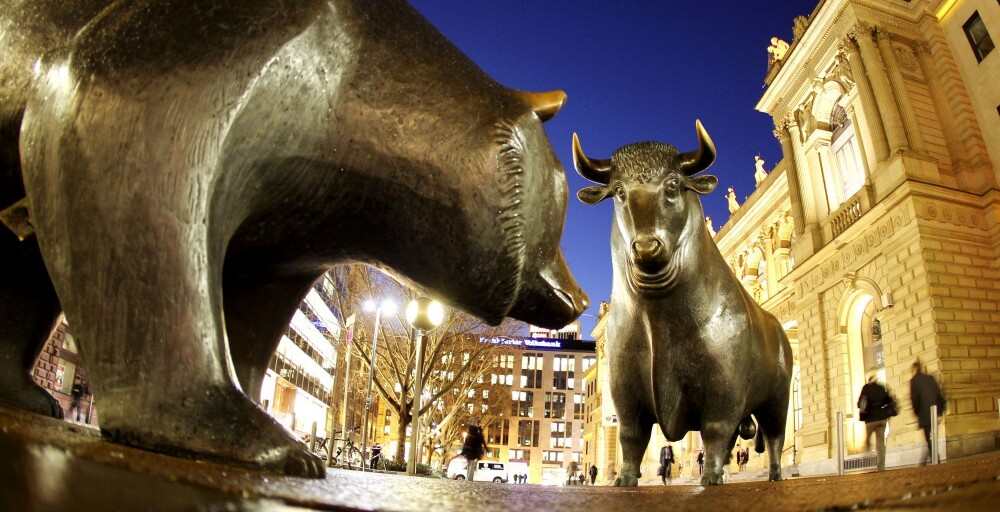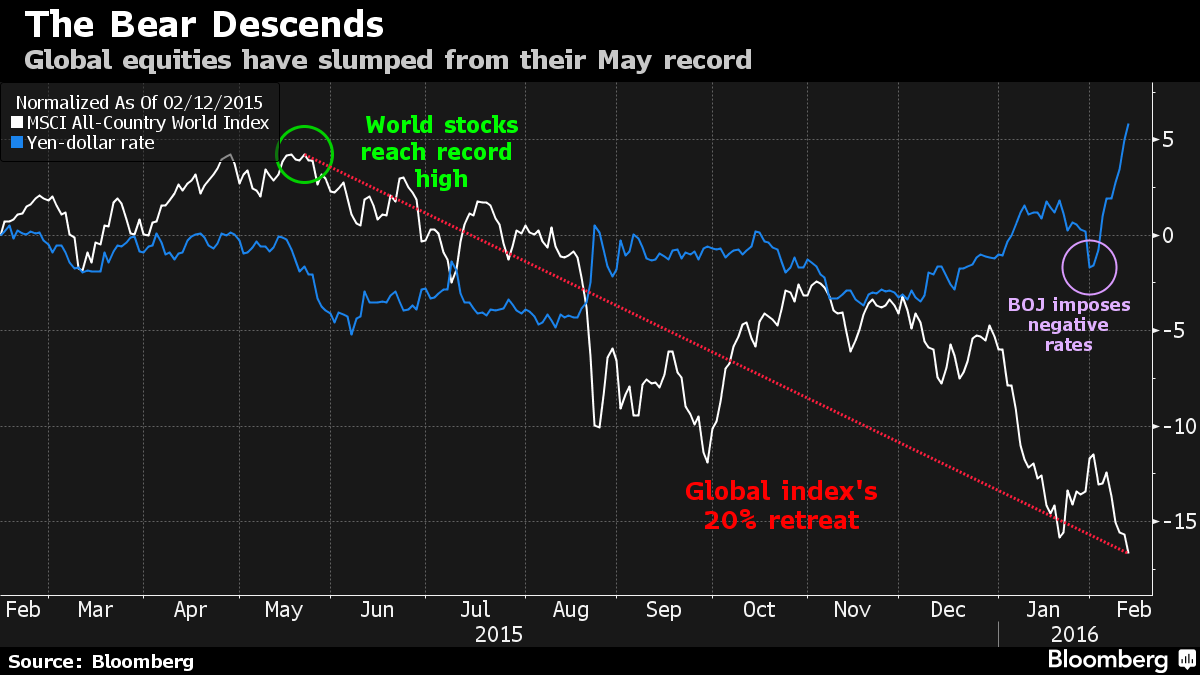
World equities descended into a bear market, as an afternoon comeback in U.S. shares failed to erase losses that sent the Standard & Poor’s 500 Index to its lowest level since 2014. Oil pared declines after sliding to a 12-year low, while the yen climbed.
The S&P 500 ended Thursday down 1.2 percent as declines that sent Europe’s benchmark to its lowest point since 2013 combined to send the MSCI All-Country World Index down 20 percent from a record reached in May, the common definition of a bear market.
Japan’s currency capped a fourth rising day, trading at its strongest level since November 2014, while 10-year Treasury yields dropped to 1.66 percent. U.S. crude clawed back some gains in electronic trading after settling down 4.5 percent at its lowest level since 2003, according to Bloomberg.
[caption id="attachment_35904" align="alignnone" width="1200"] Statistic source by Bloomberg[/caption]
Statistic source by Bloomberg[/caption]
Investors ignored a second day of testimony from Janet Yellen, whose indication that the Federal Reserve won’t rush to raise benchmark interest rates in the face of global market turmoil failed to stem a selloff in risk assets from bank shares to crude oil and emerging-market currencies.
Central banks from Europe to Japan signaling that additional stimulus is at the ready is failing to ease investor concern over global growth. Citigroup’s Economic Surprise Index already indicates data in Group of 10 economies are falling short of estimates by the most since 2013, and the selloff in crude oil and weakening credit markets are exacerbating the malaise. Yellen suggested that the Fed might delay, but not abandon, planned interest-rate increases in response to recent turmoil in financial markets.
Emerging Markets
The MSCI Emerging Markets Index sank 2.4 percent Thursday to its lowest level since Jan. 26, as losses in energy stocks and lenders left the gauge down 10 percent in 2016.
As trading resumed in Hong Kong after a three-day holiday, the Hang Seng Index slid 3.9 percent for its worst start to a lunar new year since 1994. The Hang Seng China Enterprises Index of mainland Chinese companies listed in the city slumped 4.9 percent to its lowest level since March 2009. Markets remained closed in mainland China, Taiwan, and Vietnam.
The Russian ruble and South Africa’s rand led developing-nation currencies lower with a gauge of 20 exchange rates slipping 0.4 percent, reversing earlier gains.
Currencies
The yen jumped against all of its 16 major counterparts, rising the most against the currencies of Mexico, Brazil, and Norway. It added 0.8 percent to 112.42 per dollar, after touching 110.99, its strongest level since Oct. 31, 2014.
Given the yen is now close to a level reached by the Bank of Japan unexpectedly expanded stimulus in October 2014, traders are debating whether the central bank will step in to curb its strength. The BOJ hasn’t intervened in currency markets since 2011.
“Markets appear to be testing the resolve of the BOJ and questioning the ability of monetary policy action to create a weakening Japanese yen,” said Sam Tuck, a senior currency strategist at ANZ in Auckland. “Nobody really wants their currency bouncing around too rapidly. That in itself, irrespective of the level, does suggest that there could be some smoothing action just to slow it down.”
The Bloomberg Dollar Spot Index, a gauge of the greenback against 10 major peers, was little changed following a three-day slide. The Norwegian krone fell 0.5 percent amid the declines in crude.
Bonds
Yields on U.S. 10-year Treasuries declined a sixth straight day, while rates on U.S. debt due in two years fell four basis points, or 0.04 percentage point, to 0.65 percent. Yellen added fuel to the 2016 bond rally by suggesting on Wednesday that the Fed may delay raising interest rates amid the ructions in global markets.
Portuguese 10-year bond yields jumped above 4.5 percent for the first time since March 2014, with the additional yield investors demand for holding the debt instead of benchmark German bunds reaching the widest point in more than two years.
Ten-year yields on U.K. gilts fell 13 basis points to 1.28 percent, after earlier reaching a record low. The yield on bunds due in a decade slid to as little as 0.16 percent, the least since April, and HSBC said it may drop to as low as 0.05 percent in the next four months. A gauge of the euro region’s inflation outlook reached the lowest on record.
Markets in Japan were shut Thursday for a public holiday.
Commodities
West Texas Intermediate crude futures slumped to $26.21 a barrel at settlement in New York, before paring that drop to trade back above $27 in electronic trade as the Journal said current oil prices are already forcing producers not in the Organization of Petroleum Exporting Countries to at least cap their production.
The initial rout in WTI was spurred by government data showing supplies at Cushing, Oklahoma, the biggest U.S. oil-storage hub, rose by 523,000 barrels to 64.7 million last week.
Gold climbed to its highest level in a year, nearing bull-market territory as investors sought a haven from tumbling stock markets and after Yellen suggested there may be a delay in further rate hikes. Spot prices jumped 4.2 percent to $1,247.27 an ounce, while gold futures jumped as much as 5.8 percent during the session, to $1,263.90 an ounce, the highest level since February 2015. It was the steepest intraday gain since 2009.
Photo: finance.yahoo.com







